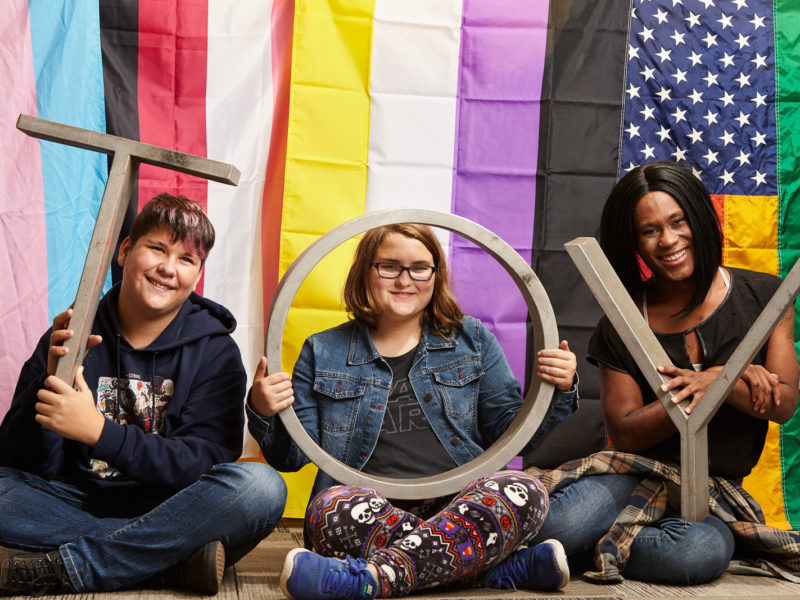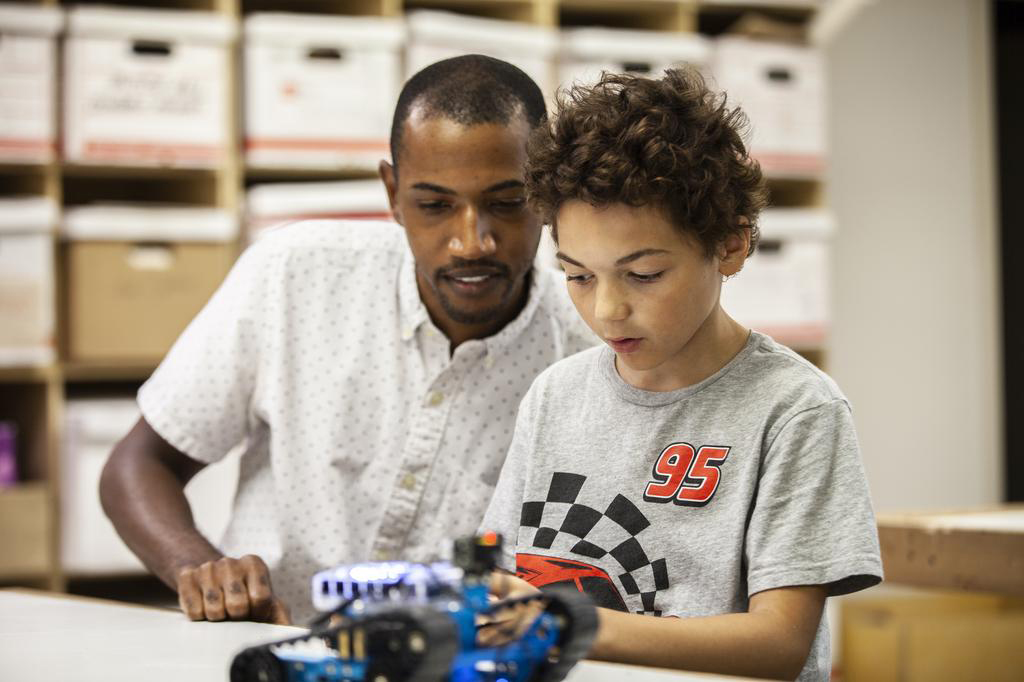
A Big Gift & Wise Investment
With FFTC’s help, Big Brothers Big Sisters establishes a fund to secure its future
When she got the email, Donna Dunlap wasn’t sure it was real.
The CEO of Big Brothers Big Sisters of Central Carolinas couldn’t believe the organization she leads was on MacKenzie Scott’s radar.
Yet, there it was. The email from the philanthropist’s team even stated: This is not a joke. In fact Scott, who was formerly married to Amazon founder Jeff Bezos and helped start the company in 1994, had donated $2.3 million to BBBSCC.
“I started crying,” Dunlap continued. “And I’m not a big crier.”
It’s not hard to imagine why MacKenzie Scott found Big Brothers Big Sisters worthy of her generosity.
The organization, explained Dunlap, “was founded over 115 years ago by a New York city court clerk who was seeing so many young men coming to his court room and entering the juvenile justice system. He felt that – and this was before any scientific studies proved his hunch – having a (mentor) dedicated to each young man could be helpful in guiding them and helping them avoid the juvenile justice system.”
Later, the group known as Big Brothers merged with an organization doing similar work with young women, and became Big Brothers Big Sisters. Every agency focuses on one-to-one mentoring for young people ages 5 to 18. The Central Carolinas agency, one of five in North Carolina, celebrated its 50th anniversary in 2022.
Local financial advisor TJ Francomano started volunteering with Big Brothers Big Sisters in May. His mentee, 7-year-old Ryker, comes from a great home. “Unfortunately, his father hasn’t been in the picture for most of his life,” Francomano said. “Ryker and I have a very close relationship. He is a very outgoing and energetic kid in need of a male role model.”
The two get together twice a month. With frequently shifting schedules, that can be a challenge, so sometimes their visits happen over FaceTime.
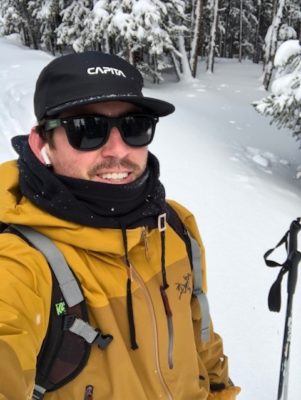
Tj Francomano, BBBSCC mentor
The pair love spending time outdoors – playing golf, going to the batting cage, walking or biking in the park, going to the playground. Their next activity will be a big adventure: They’re going rock climbing.
Ryker, an only child, considers Francomano his “real big brother.”
But Ryker isn’t the only one who benefits from the relationship. “For me, this program is very rewarding,” Francomano said. “Having someone that looks up to me and is curious is very humbling.”
Dunlap said Francomano’s experience is not unusual for both volunteers and the children they mentor.
“A big brother or big sister forms a relationship that lets that young person know they have someone in their corner, above and beyond their family or teacher,” Dunlap said. “These relationships have measurable impacts that I am personally amazed by. Academic performance is stronger. Our children graduate from high school on time. They avoid the juvenile justice system. They have a plan for success once they leave our program.”
What makes Big Brothers Big Sisters unique is that each one-on-one mentorship is supported by a caseworker that works not only with the child and mentor but also the parent.
“We’re often working with children who are living in poverty, who come from a single-parent household or have an incarcerated parent,” she said. “A lot of our children experience the trauma that comes with living in poverty and other traumas young children shouldn’t have to face. We try to change their trajectory for success.”
Planning for the Long-Term
Even before the windfall, Dunlap had been thinking about establishing an investment fund for the organization to ensure its financial stability. In 2021, she met informally with Foundation For The Carolinas Executive Vice President Brian Collier to learn about the Foundation’s investment platform.
“Nonprofits can establish a fund at FFTC and invest dollars in a spectrum of strategies from conservative to more growth-oriented options,” said Deviré Robinson, a lawyer and the Foundation’s vice president, philanthropic advancement. “The goal is growing those assets until the nonprofit is ready to use them.”
In January 2022, few months after the initial meeting with Collier, BBBSCC sold its building for a net gain of about $470,000.
“Our old building was not conducive to our goals for those we serve,” Dunlap said. “The bus stop was about a mile away on a busy street, which was difficult and not very safe. And the building was in disrepair.”
The influx of cash from the sale, in addition to the transformative MacKenzie Scott gift, spurred BBBSCC to establish an FFTC Agency Fund, investing in a long-term growth fund. Of the $2.3 million Scott donated, BBBSCC invested $1 million.
“This, hopefully, will inspire others to give,” she said. “We want to build this fund up to $3.5 million, minimally.”
Choosing a Partner in Philanthropy
Dunlap and BBBSCC board’s investment advisory council had considered and interviewed other potential partners. But she said the decision was easy.
First, there was her comfort level with the Foundation. “I’ve had a long-standing relationship with the Foundation and Brian Collier, specifically,” she said. “He provided great advice and counsel when I took this job – coming from the for-profit environment – six-and-a-half years ago.”
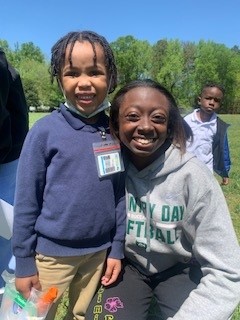
“Bigs” and “littles” match through BBBSCC
Further, there was the personal touch. Robinson’s team helps guide clients toward achieving their financial goals. The Foundation handles accounting and reporting, as well as investment oversight. “We work with an organization to help select a strategy that maximizes their investment timeline,” he said. “And we make sure the strategy fits with the goals of the organization.”
FFTC’s expert staff meets with clients annually for a fund performance review and discussion about market outlook. Beyond that, they’re available to clients when they have a question about their fund’s performance. The FFTC team provides oversight, which frees up the nonprofit’s leadership to focus on doing what they do best.
Nonprofits with funds managed by FFTC can also invest more than cash. “We accept different types of assets,” Robinson said. “We try to make it very hard for a nonprofit to ever tell a donor ‘no.’ You can contribute gifts of stock and securities. We sell the stock on receipt, the proceeds are distributed to the fund and are available to be requested.”
Dunlap added that she liked that FFTC was not just a supporter of Big Brothers Big Sisters but the community at large.
“When you establish a fund with the Foundation, you’re also supporting the community work they do,” she said. “That was the tipping point for the board and me. The Foundation is a community advocate. It’s an organization we can really get behind.”
FFTC offers more than investment oversight and expertise. In addition to fund management, FFTC helps with what Robinson calls “capacity building.”
“We help nonprofits think through board maximization and tools for board engagement and leadership,” he said. “We offer seminars and workshops on topics like planned giving, grant writing and commercial insurance – anything we think would be a true value-add for the nonprofit sector. We’re really a thought partner.”
What’s more, those services are available to all the nonprofits FFTC has relationships with – whether the Foundation manages a fund for them or not.
Protecting the future of the organization
Robinson walked Dunlap and her team through a variety of investment options tailored to their needs. “We wanted to protect the future of our organization,” Dunlap said. “But we didn’t want a scenario where that whole investment was locked up. An endowment wasn’t the right fit, but this was also meant to be more than a rainy-day fund.”
The organization chose a quasi-endowment and put in procedures for access, should there be an emergency.
An emergency scenario was very much on Dunlap’s mind after the pandemic. “If it weren’t for government funding, we might not be here today,” she said. “With MacKenzie Scott’s gift and some of the government funding, we’re now in a position to put things in place to protect our future.”
Now that BBBSCC has more cash on hand – and in the market – they’re focusing on rebuilding after COVID.
For instance, they’ve created a new position that will help young people with college and workforce readiness. “About 25 young people graduate from our program each year,” Dunlap said. “We hope we’ve given them a great foundation. Now, we’ll be in a position to help them after graduation. The person in this role will follow and support them up to age 21.”
The Scott gift has also helped Dunlap realize one of her dreams for BBBSCC – to expand its footprint and influence.
“We now have the power to support more children,” she said. “There are 50,000 children in this community who fit our profile. We serve about 1,000. I want to at least grow to serving 5,000.”
Dunlap hopes Scott’s generosity will prompt more giving.
“I don’t view the MacKenzie Scott gift as an end point,” she said. “This is a gift to inspire others to give. This is a gift that lets our community know: Big Brothers Big Sisters of Central Carolinas has been deemed worthy. We were vetted and determined to have a mission that is impactful to young people and marginalized communities. Having that endorsement may inspire others to help us take what she’s given as a seed and allow us to continue to fuel it.”
Putting the ‘Littles’ First
“I am so blessed to be part of Big Brothers Big Sisters,” said Lisa Bellini, who met her mentee, Jourdan, when Jourdan was just 8. She’s 16 now, and Bellini considers Jourdan part of her family. Bellini feels she’s part of Jourdan’s family, too.
Jourdan is one of seven kids. She has a strong relationship with her mother, grandmothers, siblings and aunt. Her dad is involved in her life, too – but her mom is her primary caregiver.
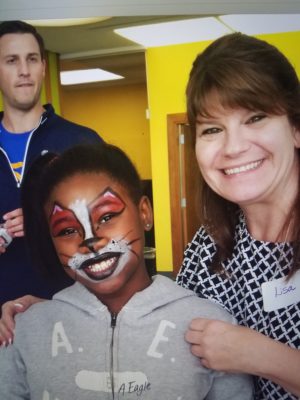
Jourdan and her Big Sister, Lisa Bellini, when Jourdan attended Nations Ford Elementary.
Bellini, a retiree who enjoys tutoring, was volunteering as a lunch buddy for Jourdan at Nations Ford Elementary when she met a man in the cafeteria serving as a mentor through Big Brothers Big Sisters. Bellini was familiar with the organization and its mission and knew she could have a greater impact on Jourdan if she were to be more than a lunch buddy.
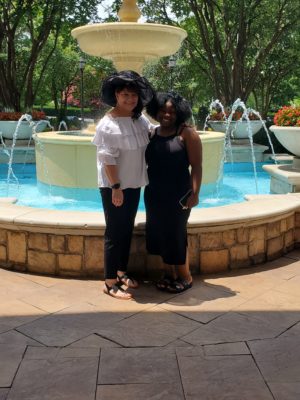
Big Sister, Lisa Bellini, and her mentee, Jourdan, spending quality time together.
That’s when she signed on with Big Brothers Big Sisters.
Jourdan is a student at Phillip O. Berry Academy of Technology, a CMS Title IX high school in Charlotte, and takes part in a vocational training program there. The HVAC training will be nice to have in her back pocket, but Jourdan plans to become a nurse. She wants to attend an HBCU, and – when she does – she’ll be the first member of her family to go to college.
Jourdan also works three afternoons a week at a QT near her house.
There’s nothing Bellini and Jourdan can’t discuss – from race to sex and consent. Since Jourdan was young, she’s had a motto: BBBBB. It stands for “Boys Before Books Brings Babies.” Jourdan has always put her studies first.
Bellini discusses Jourdan’s academics and life goals with Jourdan’s mom. “I know what her mom wants for her,” she said. “And I want to help her achieve those dreams of going to college and becoming a nurse.
“I take my responsibility as a Big Sister seriously. Jourdan is not my child, but there is nothing I wouldn’t do for her.”
Find out more about Big Brothers Big Sisters of Central Carolinas: bbbscentralcarolinas.org/


